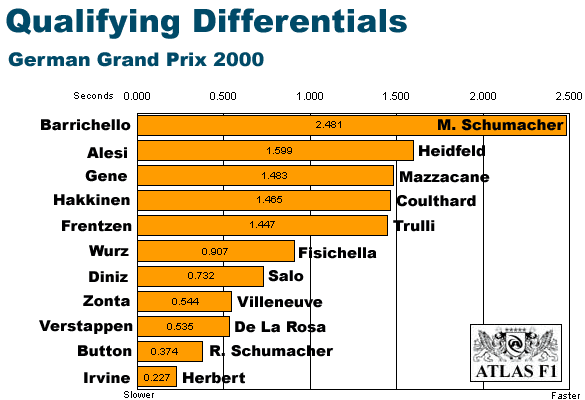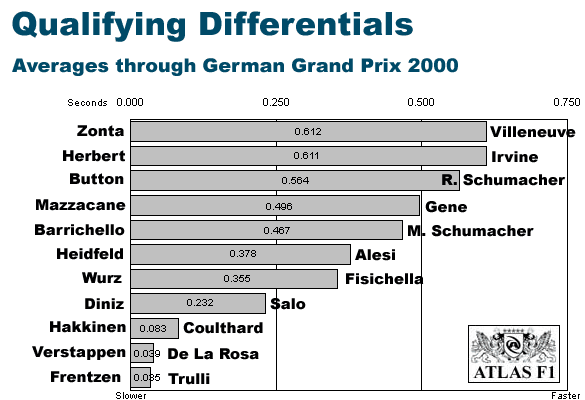|
Atlas F1 is going to keep an eye on the battle between teammates throughout the season with a simple measurement: we compare the qualifying times of each driver against his teammate's result. After every Grand Prix, we will show how teammates have fared up against each other, and where they are overall since the beginning of the season. At the end of the season, the World Champion of Qualifying Differentials will be elected - the driver who was most beaten by his teammates, in seconds. Only those who participate in at least 15 of the 17 rounds are eligible for the coveted crown; and for those who made the efforts and participated in all 17 races, the best and worst result will be scrapped.
With eleven qualifying sessions completed for 2000, the differentials are on a roll! Let's see which drivers deserve bragging rights.
Germany Notables
- Barrichello. The maiden winner of the German Grand Prix had, as he himself testified, a qualifying practice from hell. Spinning out along with Giancarlo Fisichell, Rubens Barrichello had to rush to the pits, only to find that he does not have a spare car ready and that he has to wait until teammate Schumacher's car will be fixed as well. The session ended with Barrichello qualifying way down the grid but what's worse, with the largest gap from a teammate so far this year - almost 2.5 seconds. However, we're pretty sure that, if offered a deal to always qualify as badly and still win a commanding race the day after - Barrichello will take the deal with both hands...
- Zonta. Again, not a weekend to remember for Ricardo Zonta, who must be wondering why he gets the blame weekend after another. There is, however, one driver on the grid that may want to thank the Brazilian - Johnny Herbert, himself outqualifying his teammate, was demoted by Zonta to second place in the overall averages, with a mere 0.001s separating the Jaguar duo's average from the of the BAR's.
- The Excuses. As can be expected, those who did badly - and even those who did well - blamed it on the weather. But as we always exclaim, all drivers had the same hour to set the time and therefore the weather conditions will not be accepted as mitigating circumstances. In any case, the worst result for each driver will be scrapped at the end of the year so no need to think it's all over...
- Changes Since Austria: Pedro de la Rosa, David Coulthard and Jarno Trulli had each passed his respective teammate in the overall averages chart, all three team duos extremely close to each other.
The average gap between teammates in Germany was the biggest so far this year - 1.072. In contracts, the average gap in Austria was the smallest so far this year - only 0.288s. This, compared to the gap in France, which was 0.400; Canada had 0.449; 0.486 in Monaco; 0.546s in Europe; 0.48s in Spain; 0.725s in Britain; 0.654s in San Marino; 0.455s in Brazil; and 0.874s in Australia.
|


